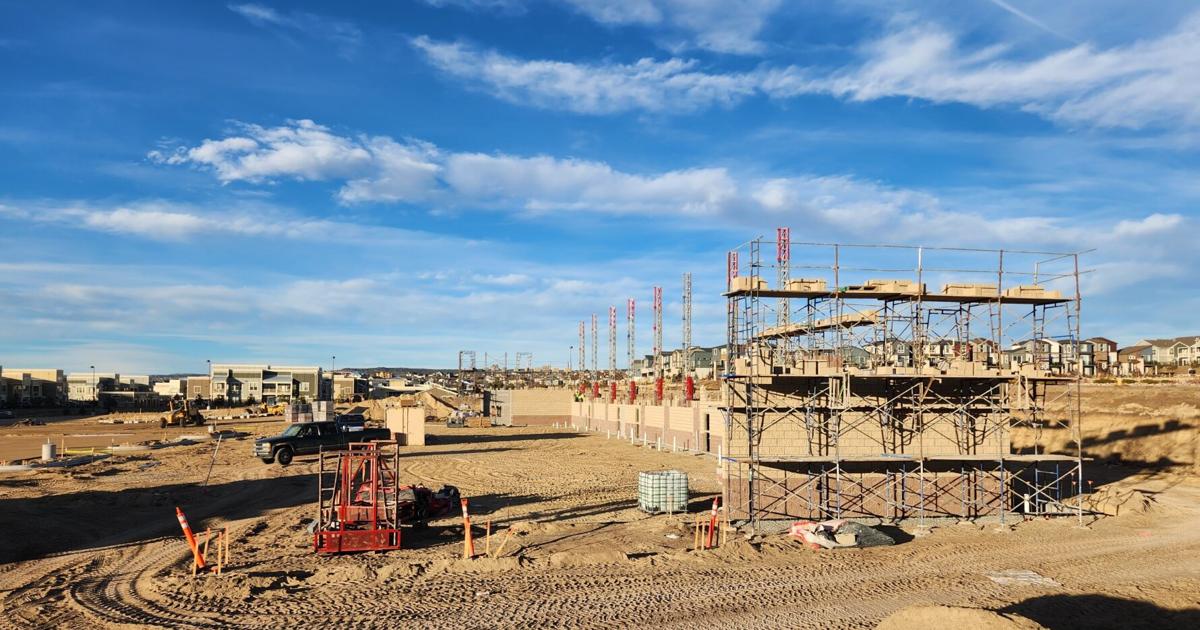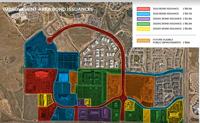The El Paso County District Court ordered a business improvement district on the north side of Colorado Springs to release all construction contracts, plans, and payments related to public improvements, such as roads and water lines.
“It’s a blockbuster decision,” said John Henderson of Coloradans for Metro District Reform. “We’re going to use it whenever we get the chance to pull the curtain back.”
The court’s decision could set a higher standard of transparency about contractors’ expenses that are then reimbursed by taxes and open the door to public inspection of documents that show whether the millions in reimbursements developers are asking taxpayers to pay are justified, Henderson said. The attorney worked on statewide reform for developer-run tax districts, but did not work on this case.
“There is no accountability unless you have access to financial records that account for the spending of public money,” he said.

A map presented to the Colorado Springs City Council shows the areas of the InterQuest North Business Improvement District.
Previously, developers argued that private contracts for infrastructure, even if they included work on public projects such as roads, were not public documents. However, developers in Colorado are often reimbursed for public infrastructure through property taxes paid to special districts they control. Because these districts are forms of local government, records of public infrastructure spending should be made available to taxpayers, Henderson said.
“As soon as you create this district, I’m sorry, you are the government and you are obligated, like all other governments in the United States, to disclose financial information about how you spent public money,” Henderson said.
Colorado developers have argued in the past that third-party engineer certification is sufficient to determine whether claims for public infrastructure reimbursements are appropriate. But Henderson and others have noted that the engineers hired by the developers who control the districts are not truly independent.
If so, the recent decision will allow the public to audit how the Norwood Development Group has spent money on public infrastructure in the InterQuest North Business Improvement District, allowing for greater transparency, said Tim Leonard, who represents a business in the shopping district, Cheddar’s Scratch Kitchen in district elections.
The Norwood-controlled InterQuest North district covers businesses near InterQuest Parkway and Federal Drive, such as Scheels All Sports and Great Wolf Lodge. The companies pay property taxes to the district to cover payments on about $25 million in debt spent on public infrastructure.
Prior to the district court’s decision on July 10, Leonard said he received 9,000 pages of documents from the district through open records requests, but they were a “nightmare” to review and did not show how much had been spent on public improvements. They showed that Norwood was bundling public and private improvements in the same contract, he said.
Tim Seibert, Norwood’s senior vice president, said the company has contracted public and private improvements on the same projects because it allows for efficient construction and engineering. After the work is completed, the company asks the district to reimburse the cost of the improvements that benefit the entire district through property taxes.
He defended the practice of using an engineer hired by the developer-controlled district to certify improvements, saying engineers could lose their license if they failed to complete the work properly.
In terms of transparency, Seibert said Norwood and the district it controls have worked to comply with the state’s open records law throughout the lawsuit.
The district initially withheld the contracts because the district attorney said it could set a “dangerous precedent” that the state’s open records law requires inspection of the “internal records of any private entity that does business with the public entity.”
The first court decision sided with Norwood. When the Court of Appeals overturned the decision, Norwood provided Leonard with documents, such as supporting spreadsheets and invoices, Seibert said. He also noted that the July court ruling denied Leonard’s request for depositions from Norwood contractors and employees and to issue subpoenas to district engineers.
Following the court’s final decision this month, Leonard said he plans to file another request for documents dating back to the start of the InterQuest North project in the mid-2000s in a form that would be easier to review.
He also called on the Colorado Springs City Council to demand more transparency from business improvement districts.
In a letter to council, Leonard noted that the city had refused to support his call for more transparency from the district in the past, saying it was a private matter and so his fight for transparency in court has taken three years and cost tens of thousands of dollars that will have to be reimbursed by the district.
“I would like to urge the current Board members to demand more transparency and accountability from the BIDs and metropolitan districts that are under your supervision. Shifting this responsibility to single taxpayers is unfair and highly inefficient,” he wrote.
Colorado Springs is home to about 20 business improvement districts, about 10 of which are controlled by Norwood, such as the districts used to fund construction near Barnes Road and Powers Boulevard and the First and Main Mall near Powers and Carefree Circle.
City Council reviews business improvement district budgets each year, but City Auditor Jackie Rowland previously said the city does not have the authority to audit them because they are separate entities.
City Council Speaker Randy Helms said business improvement districts must follow approved plans and budgets, but he planned to consider whether the city should provide more oversight after the budget is approved.






